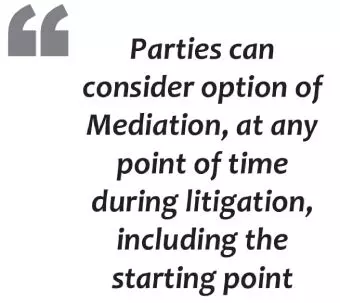- Home
- News
- Articles+
- Aerospace
- Artificial Intelligence
- Agriculture
- Alternate Dispute Resolution
- Arbitration & Mediation
- Banking and Finance
- Bankruptcy
- Book Review
- Bribery & Corruption
- Commercial Litigation
- Competition Law
- Conference Reports
- Consumer Products
- Contract
- Corporate Governance
- Corporate Law
- Covid-19
- Cryptocurrency
- Cybersecurity
- Data Protection
- Defence
- Digital Economy
- E-commerce
- Employment Law
- Energy and Natural Resources
- Entertainment and Sports Law
- Environmental Law
- Environmental, Social, and Governance
- Foreign Direct Investment
- Food and Beverage
- Gaming
- Health Care
- IBC Diaries
- In Focus
- Inclusion & Diversity
- Insurance Law
- Intellectual Property
- International Law
- IP & Tech Era
- Know the Law
- Labour Laws
- Law & Policy and Regulation
- Litigation
- Litigation Funding
- Manufacturing
- Mergers & Acquisitions
- NFTs
- Privacy
- Private Equity
- Project Finance
- Real Estate
- Risk and Compliance
- Student Corner
- Take On Board
- Tax
- Technology Media and Telecom
- Tributes
- Viewpoint
- Zoom In
- Law Firms
- In-House
- Rankings
- E-Magazine
- Legal Era TV
- Events
- Middle East
- Africa
- News
- Articles
- Aerospace
- Artificial Intelligence
- Agriculture
- Alternate Dispute Resolution
- Arbitration & Mediation
- Banking and Finance
- Bankruptcy
- Book Review
- Bribery & Corruption
- Commercial Litigation
- Competition Law
- Conference Reports
- Consumer Products
- Contract
- Corporate Governance
- Corporate Law
- Covid-19
- Cryptocurrency
- Cybersecurity
- Data Protection
- Defence
- Digital Economy
- E-commerce
- Employment Law
- Energy and Natural Resources
- Entertainment and Sports Law
- Environmental Law
- Environmental, Social, and Governance
- Foreign Direct Investment
- Food and Beverage
- Gaming
- Health Care
- IBC Diaries
- In Focus
- Inclusion & Diversity
- Insurance Law
- Intellectual Property
- International Law
- IP & Tech Era
- Know the Law
- Labour Laws
- Law & Policy and Regulation
- Litigation
- Litigation Funding
- Manufacturing
- Mergers & Acquisitions
- NFTs
- Privacy
- Private Equity
- Project Finance
- Real Estate
- Risk and Compliance
- Student Corner
- Take On Board
- Tax
- Technology Media and Telecom
- Tributes
- Viewpoint
- Zoom In
- Law Firms
- In-House
- Rankings
- E-Magazine
- Legal Era TV
- Events
- Middle East
- Africa

Mediation As a mode of Alternate Dispute Resolution
Mediation As a mode of Alternate Dispute Resolution

Mediation As a mode of Alternate Dispute ResolutionThe Provision of Mediation as a Mode of a DR in The Indian Legal System, Dates Back to Year 1947 When The Industrial Disputes Act, Was Passed…The six months of the COVID-19 lockdown are transforming the way of doing business and office working, with the emergence of the new normal, we all have realized that newer opportunities are taking...
To Read the Full Story, Subscribe to Legal Era News
Access Exclusive Legal Era Stories, Editorial Insights, and Expert Opinion.
Already a subscriber? Sign in Now
Mediation As a mode of Alternate Dispute Resolution
The Provision of Mediation as a Mode of a DR in The Indian Legal System, Dates Back to Year 1947 When The Industrial Disputes Act, Was Passed…
The six months of the COVID-19 lockdown are transforming the way of doing business and office working, with the emergence of the new normal, we all have realized that newer opportunities are taking time in shaping up. The stuck-up projects, have started to move into the new normal. Excluding a few, all the businesses and individuals are fighting the real-life challenges in managing cash flow to survive and grow. This has not left business or individuals, with either luxury of litigations or waiting endlessly for legal solutions. Judiciary continuing dealing with urgent matters, restrictions on IBC clauses, for the small and mid-size business disputes, litigations alternative has become really a luxury. This all leads to one road to unlock the business opportunities stuck up in the litigation and also to the matters which are at the stage of entering into litigation, by looking objectively at alternative methods of dispute resolution. Good lawyers / law firms are already suggesting to move to alternate dispute resolution (ADR) – with a focus on Mediation – a speedy, easy and economical option.

The provision of Mediation as a mode of ADR in the Indian legal system, dates back to year 1947 when The Industrial Disputes Act, was passed with a provision to recognize Mediation as a method of resolving disputes. This was keeping in mind providing the option of quick, confidential and forward-looking relations method of resolving disputes. The usage of the same remains restricted to industrial relations.
In the year 1999, the Code of Civil Procedure was amended to allow the courts to refer the matters to any of the five, ADR methods - namely Arbitration, Conciliation, Judicial Settlement, Lok Adalat or Mediation under Section 89 and Order X Rule 1A of Code of Civil Procedure, 1908, to settle pending disputes. This amendment was a move to open up the option of negotiation for old, long pending litigations and also to reduce the filing of new litigations as well as resolving the same amicably and quickly. The looking up options of solutions, which will be more or less, equivalent to final order of judiciary after 3-15 years (including time of right to appeal, which is mis-used a good number of times to defer the solutions) and at the same time, keeping the option of current and future business relations to keep going, with good spirit, even if not with the previous level of trust.
Some hard realities about business disputes, which start with failures to perform on contract, some disagreement/in-competencies, negligence, missing milestones, delayed execution, at first level. Then parties continue with the business at the operational level for many reasons. It may be due to business compulsions or terms and conditions of the contract or hoping to resolve / giving time and opportunity to correct the failure or even sometimes affording cover-up option by the first level people at the ground. Then based on the briefings by the first level, the minor failures get poised to convert into major disagreements. Instead of looking at the solution objectively, for many reasons, these disagreements are allowed to get converted into disputes for litigation. One of the bad reasons, sometimes it is a transfer of issue from business to legal department. Last and worst is, egos of either or both the parties or their senior executives, which impedes solution. Yes, sometimes, the dispute is due to genuine inability of one party to perform or pay in full. Even in that genuine case, if the parties openly discuss what is possible and what is not possible, why and when it will be made possible, can open up window of resolution. This is what is the base for ADRs and the best alternative to negotiated settlement is - MEDIATION among ADRs, in current circumstances.
In July 2010, the Supreme Court while clarifying on the legal provisions, laid down guidelines for referring matters to ADRs in Afcons Infrastructure Ltd. and Anr. V. Cherian Varkey Construction Co. Pvt. Ltd. and Ors. quoting from the order itself: Section 89 of CPC has to be read with Rule 1-A of Order 10 which requires the court to direct the parties to opt for any of the five modes of alternative dispute resolution processes and on their option refer the matter. The said rule does not require the court to either formulate the terms of settlement or make available such terms of settlement to the parties to reformulate the terms of possible settlement after receiving the observations of the parties.
Therefore, the only practical way of reading Section 89 and Order 10, Rule 1-A is that after the pleadings are complete and after seeking admission/denials wherever required, and before framing issues, the court will have recourse to section 89 of the Code.
It was reinforcing the legal provisions, which were already present. While clearly excluding matters, which cannot be referred to ADR, in most of the other matters recommended ADR process. It excluded the following six categories of the matters from ADR provisions:

(a) Representative suits which involve public interest or interest of numerous persons who are not parties before the court.
(b) Disputes relating to election to public offices.
(c) Cases involving grant of authority by the court after enquiry, as for example, suits for grant of probate or letters of administration.
(d) Cases involving serious and specific allegations of fraud, fabrication of documents, forgery, impersonation, coercion etc.
(e) Cases requiring protection of courts, as for example, claims against minors, deities and mentally challenged and suits for declaration of title against government.
(f) Cases involving prosecution for criminal offenses.
It means most of the other matters can be referred to ADR. The order further clarified:
– Disputes between neighbors (relating to encroachments, nuisance etc.);
– Disputes between employers and employees;
– Disputes among members of societies/associations/apartment owners associations.
Besides above, all cases relating to tortious liability including claims for compensation in motor accidents / other accidents can be resolved by ADR; Here, we can also use the digital mode of video calls to cross check the evidencing. All consumer disputes including Disputes where a trader / supplier / manufacturer / service provider is keen to maintain his business/professional reputation and credibility or `product popularity. The Consumer Protection Act, which came into force in July this year reinforced the provisions of Mediation applicable to Consumer disputes.
Now there are few fears in the mindset - when the mediation is non-binding, whether it will be effective? What is the success ratio so far? At what stage parties can consider to mediate? Answers to the same are, MEDIATION is a quick, cost effective and confidential method of finding solutions to the issues. Success ratio of past which we are looking at was at 50%, but it was related to few referred suits, mostly family matters. Importantly, ADR or Litigation is the mode to arrive at a settlement or solution, but it will be successful if we change our mindset to look at objective practical business solution. Parties can consider option of Mediation, at any point of time during litigation, including the starting point. Mediation is possible and effective way of resolving disputes speedily and economically.


